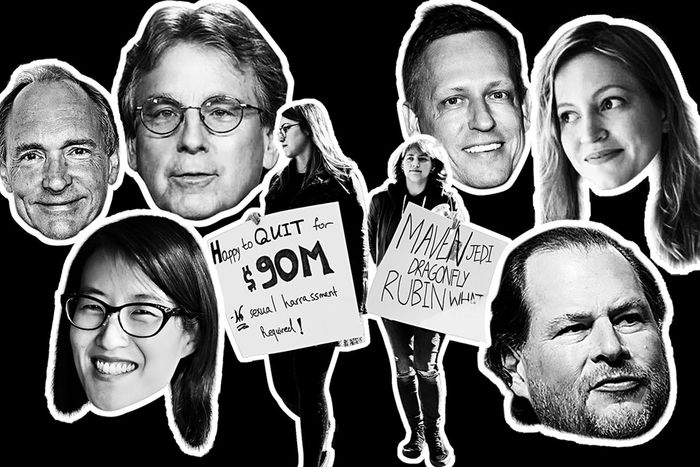
Last month, as Sacha Baron Cohen was delivering his made-for-social-media anti-social-media diatribe at the Anti-Defamation League, Tim Berners-Lee, the literal inventor of the World Wide Web, was preparing to step out from the shadows to acknowledge that, well, things online hadn’t gone exactly how he’d hoped — that the internet was at a “tipping point” and in need of root-and-branch remodeling. But Berners-Lee isn’t alone. In fact, it can seem these days like tech apostates might outnumber evangelists in Silicon Valley, which once looked from afar like a practical cult of sunny-side-up solutionism but now offers a new opportunity for self-promotional branding: pivoting to tech-flagellation. Here, a survey of which of those new turncoats are most likely to make an impact, which are speaking out as a salve to their own consciences, and which are just reading the direction of public opinion and torquing themselves accordingly.
1. Google Workers
Even in a world that seems to run on conference-circuit oxygen, mass protests matter, which is why the most significant recent act of tech apostasy probably wasn’t by an individual but an enormous group. A 20,000-employee-and-contractor walkout at Google in November 2018 has flowered into a year’s worth of employee activism against internal policies on sexual assault and partnerships with ICE and U.S. Customs and Border Protection, among other issues, and helped inspire similar internal protests at Microsoft and Facebook led by engineers who literally hold the keys to the whole ecosystem.
2. Tim Berners-Lee
Berners-Lee may not own a company or lead a union, but he invented the World Wide Web, which is pretty hard to beat as far as influence goes. What Berners-Lee is proposing is pretty radical — a total overhaul of the web that even has some buy-in from governments in Germany and France and companies like Facebook and Microsoft.
3. Marc Benioff
Just behind the bottom-up efforts of workplace reformers lie the top-down efforts of Silicon Valley’s most widely liked and respected CEO. Salesforce’s Benioff has pushed for a “new capitalism” and demanded that tech CEOs be activists. If tech executives won’t listen to politicians and journalists, they might at least listen to one of their peers?
4. Peter Thiel
Thiel is indubitably a tech critic — he’s just coming at it from a different angle than most. But an apostasy on the right counts, too, and the enigmatic investor spent the summer all but accusing Google of treason and suggesting that tech companies were betraying American interests in their quest for global markets. That Thiel is regarded as a Valley intellectual, even if he’s not politically aligned with many of its reformers, makes him a force to be reckoned with.
5. Susan Fowler
Fowler is best known for helping kick off a movement to expose sexual harassment and gender discrimination in Silicon Valley with a blog post about her experiences at Uber. But she’s only expanded her platform since: She’s now an editor for the New York Times op-ed page, which has ramped up its unsparing coverage of the tech world. Her name may not be as recognizable as Thiel’s or Benioff’s, but the pieces she writes and edits are read by many of the country’s most powerful people.
6. Jaron Lanier
There are a lot of industries that wouldn’t take very seriously a white guy with dreadlocks who plays rare Asian flutes. Not Silicon Valley. Lanier’s status as a virtual-reality pioneer gives a special authority to his condemnations of the practices and faults of tech — most recently in his book Ten Arguments for Deleting Your Social Media Accounts Right Now.
7. Tristan Harris
Harris, a onetime design ethicist at Google, has become the face of the “time well spent” movement — the idea that social networks and other tech companies shouldn’t participate in a “race to the bottom for attention.” Journalists, at least, are paying attention.
8. Roger McNamee
As an early investor in Facebook, quasi-hippie venture capitalist McNamee helped Mark Zuckerberg hire Sheryl Sandberg — exactly the kind of I-was-there authority necessary to become a powerful critic. Now he’s doing all he can to stop the company — including writing Zucked, an excoriating book about his former mentee.
9. Ellen Pao
Pao lost a gender-discrimination lawsuit filed against her former employers at the famous venture-capital firm Kleiner Perkins, but her long résumé — she was, briefly, the CEO of Reddit — and extensive Silicon Valley network have elevated her profile as one of the fiercest critics of Silicon Valley’s deeply ingrained sexism.
10. Chris Hughes
Zuckerberg’s sophmore-year roommate — and probably one of Silicon Valley’s most-accidental elites — has recently tried to make himself relevant by reading the mood of the country, turning on Zuck and endorsing an antitrust approach to big tech.
*This article appears in the November 25, 2019, issue of New York Magazine. Subscribe Now!







































